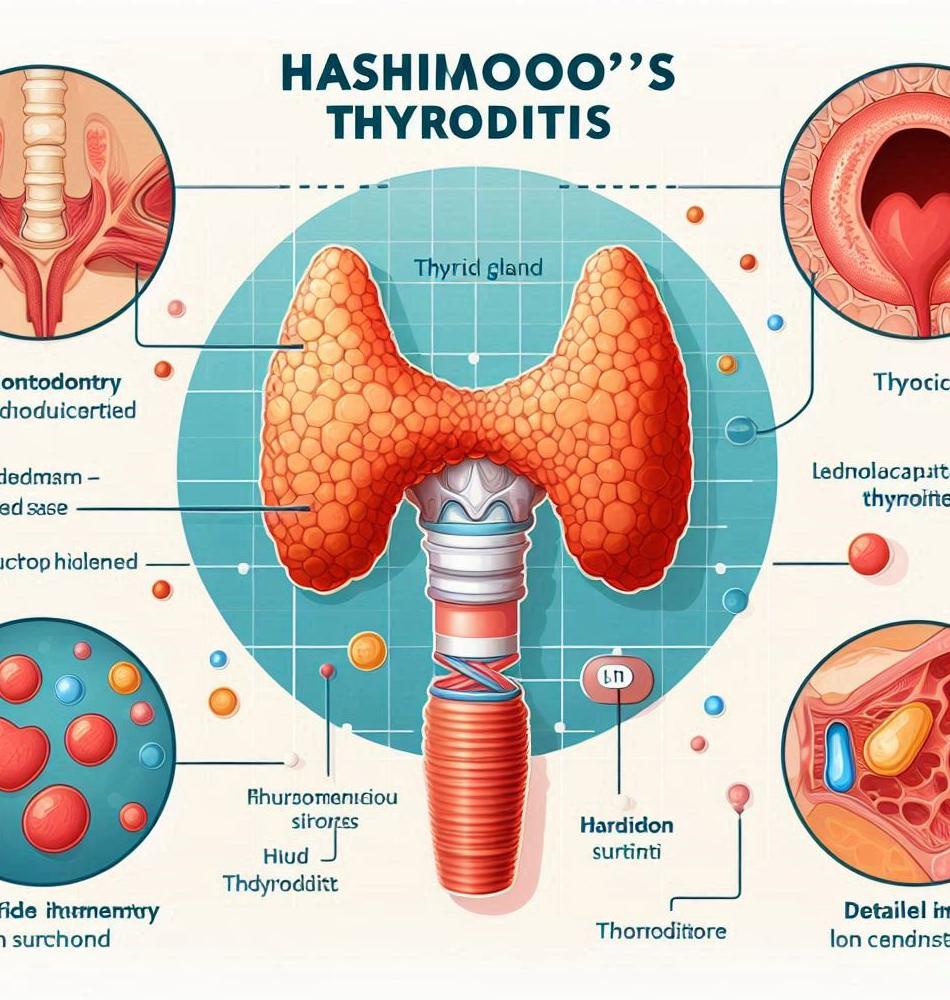Understanding Hashimoto's Disease: An Insight into This Autoimmune Disorder 🦠
Discover the complexities of Hashimoto's disease, its symptoms, diagnoses, and how it intertwines with the broader concept of autoimmune disorders.
Introductory paragraphs can often set the tone for an entire piece. In this case, let’s delve into a condition that affects countless individuals yet often goes unnoticed or misdiagnosed. Hashimoto's disease is indeed an autoimmune disorder, and it can profoundly affect many aspects of one's health. The journey of understanding it involves looking beyond mere symptoms to uncover the underlying mechanisms. What really happens in the body when Hashimoto's takes hold? What underlying causes contribute to its development? Let's explore the answers!
The Nature of Hashimoto's Disease 🔍
At its core, Hashimoto's disease is an autoimmune condition that primarily affects the thyroid gland. The thyroid, a butterfly-shaped gland located in your neck, plays a pivotal role in regulating your body’s metabolism, heart rate, and temperature. When one has Hashimoto's, their immune system mistakenly attacks this gland as if it were a foreign invader. This can lead to a deficiency of thyroid hormones, resulting in a variety of health issues.
What Causes Hashimoto's Disease? 🌪️
The precise cause of Hashimoto's disease is still under research, yet several factors appear to play a role.
Genetics
Family history can significantly influence one’s likelihood of developing Hashimoto's disease. It tends to occur in families where autoimmune diseases are prevalent. If someone in your family has an autoimmune disorder, your risk could be higher.
Environmental Factors
Various environmental triggers may lead to the onset of Hashimoto's. These can include:
- Excessive iodine intake
- Exposure to radiation
- Viral infections
- Stressful life events
Symptoms of Hashimoto's Disease 🩺
Recognizing Hashimoto's involves being attuned to various physical and emotional symptoms. Some common symptoms include:
Physical Symptoms
- Fatigue
- Weight gain
- Cold intolerance
- Constipation
- Dry skin and hair
- Muscle weakness
- Joint pain and swelling
Emotional Symptoms
- Depression and anxiety
- Memory issues or brain fog
- Irritability
Some individuals may not experience noticeable symptoms until the condition escalates. For others, symptoms might appear gradually. Recognizing these early signs is crucial for timely intervention.
Diagnosing Hashimoto’s Disease 🧪
Diagnosing Hashimoto's disease typically entails a combination of physical examinations, symptom evaluations, and laboratory tests. Blood tests usually reveal antibodies against thyroglobulin and thyroid peroxidase—key indicators of this autoimmune disorder.
Thyroid Function Tests
Healthcare providers commonly check for the following:
- T4 (thyroxine)
- T3 (triiodothyronine)
- TSH (thyroid-stimulating hormone)
Antibody Testing
The presence of thyroid antibodies in your blood is an essential marker for Hashimoto's. A positive result can lead to further investigation and possible diagnosis.
Treatment Options for Hashimoto’s Disease 💊
If you are diagnosed with Hashimoto's disease, don’t panic! There are effective treatments available that can help manage symptoms and improve quality of life.
Thyroid Hormone Replacement Therapy
The most common treatment approach involves hormone replacement therapy. Synthroid, a synthetic form of thyroxine (T4), is the most frequently prescribed medication. It works by restoring hormone levels and relieving symptoms.
Regular Monitoring
Once on medication, regular monitoring becomes vital. Your healthcare provider will likely recommend periodic blood tests to ensure your TSH levels remain within the target range.
Lifestyle Changes 🥗
Embracing a healthier lifestyle can enhance the quality of life for someone with Hashimoto's. Consider the following tips:
- Eat a balanced diet rich in vitamins and minerals
- Exercise regularly to boost physical and mental well-being
- Manage stress through mindfulness techniques
- Avoid smoking and excessive alcohol consumption
Hashimoto’s Disease and Mental Health 🧠
The impacts of this condition aren’t confined to the physical realm—they extend into emotional and mental health too. Many individuals with Hashimoto's report feelings of fatigue and cognitive challenges, also known as brain fog. This can contribute to anxiety and depression, making it imperative to address both physical and mental health with your treatment plan.
Therapeutic Approaches 🌈
Alongside medical treatment, consider engaging in therapy or counseling, as it can provide support for navigating emotional challenges. Group therapy may also offer a sense of community, allowing individuals to connect with others facing similar symptoms.
Frequently Asked Questions ❓
Here are some frequently asked questions regarding Hashimoto's disease:
- Is Hashimoto's disease hereditary?- Can diet play a role in managing Hashimoto's symptoms?- Are there alternative treatments for Hashimoto's disease?- Is it possible to outgrow Hashimoto's disease?- How does Hashimoto's disease affect pregnancy?Hashimoto's disease is indeed an autoimmune disorder, and understanding its intricacies can empower individuals to make informed decisions about their health. From symptoms to diagnosis, treatment, and lifestyle changes, this multifaceted condition impacts many aspects of life.
Conclusion 🏁
Hashimoto's disease is more than just a condition; it is a journey through understanding, acceptance, and management. Through education and a proactive approach to health, living well with Hashimoto's is entirely attainable. Should you notice any concerning symptoms, reaching out to a healthcare provider can be the first step in taking charge of your health and well-being. Remember, awareness is the first step toward better management of this autoimmune disorder.
.png)





